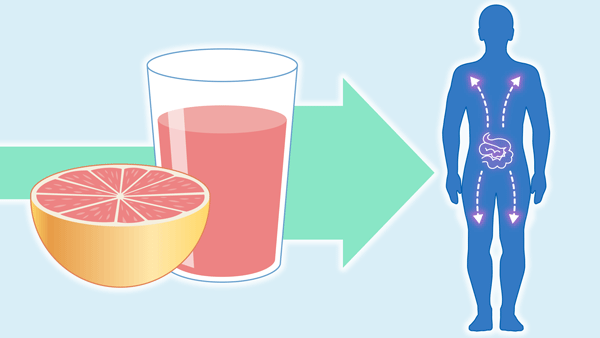The United States Food and Drug Administration recently published an article about the need to avoid the combination of grapefruit juice and certain medications. Although some studies have shown that the consumption of grapefruit juice could reduce the risk of developing diabetes, heart disease and obesity; however, caution should be taken when consuming grapefruit juice with some medications used in the treatment of high blood pressure and cholesterol due to drug and food interaction.
Grapefruit juice is inexpensive, readily available, rich in potassium, and contains vitamins A and C; hence, many people consume the juice almost on a daily basis for its health benefits. But, it is important to evaluate the drug and food interaction because it affects the way some medications work by either increasing or decreasing the concentration of the drug in the blood.
When a drug is administered, it gets metabolized by a class of enzymes known as cytochrome P450 (CYP). These enzymes are present throughout the body, especially in the liver and intestines, where drugs are broken down. The blockade of these enzymes lead to increased drug concentration in the blood and the patient might end up experiencing adverse effects from the drug. Grapefruit juice interacts with drugs by blocking these enzymes. On the other hand, grapefruit juice could also cause reduction in the concentration of other drugs by blocking the proteins that transport drugs into the blood. This action could lead to decreased drug level in the blood and reduced efficacy or effectiveness of the drug.
Majority (approximately 75%) of medications that use the CYP pathway are metabolized by CPY3A4. Thus, any patient who takes verapamil, a calcium channel blocker used for high blood pressure treatment could be at risk for very low blood pressure (hypotension) and abnormally slow heart rate (bradycardia). Grapefruit juice also interacts with cholesterol lowering agents. For example, consuming grapefruit juice prior to or while taking certain statin, including atorvastatin or simvastatin would increase the drug concentration in the blood; therefore, increasing the risk for liver toxicity and muscle damage.
Moreover, another drug grapefruit juice interferes with is fexofenadine, a second generation antihistamine used for allergies. If this drug is taken with grapefruit juice, the concentration of the drug in the blood could be reduced and the patient would have no benefit from using the drug.
The health impact of this interaction depends on various factors such as the quantity of grapefruit juice consumed, the person (rapid versus slow metabolizer) and the type of drug involved. Avoiding excessive amounts of grapefruit juice is likely safe with some medications, but I recommend you check with your doctor, pharmacist or other healthcare providers before gulping your next glass of grapefruit juice.
AUTHOR:- Eddy I. Airiohuodion, Pharm.D, R.Ph.


I like the article